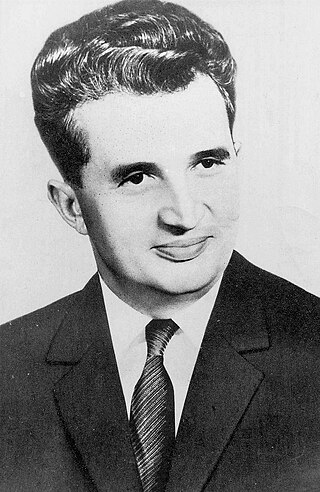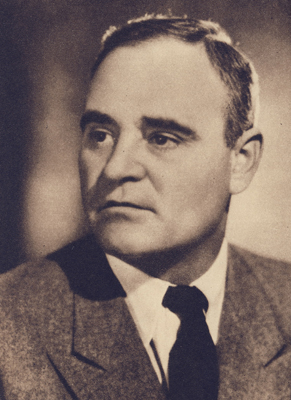
Nicolae Ceaușescu was a Romanian communist politician and dictator. He was the general secretary of the Romanian Communist Party from 1965 to 1989, and the second and last communist leader of Romania. He was also the country's head of state from 1967, serving as President of the State Council and from 1974 concurrently as President of the Republic, until his overthrow and execution in the Romanian Revolution in December 1989, part of a series of anti-Communist uprisings in Eastern Europe that year.

The Socialist Republic of Romania was a Marxist–Leninist one-party socialist state that existed officially in Romania from 1947 to 1989. From 1947 to 1965, the state was known as the Romanian People's Republic. The country was an Eastern Bloc state and a member of the Warsaw Pact with a dominant role for the Romanian Communist Party enshrined in its constitutions. Geographically, RSR was bordered by the Black Sea to the east, the Soviet Union to the north and east, Hungary and Yugoslavia to the west, and Bulgaria to the south.

Gheorghe Gheorghiu-Dej was a Romanian communist politician and electrician. He was the first Communist leader of Romania from 1947 to 1965, serving as first secretary of the Romanian Communist Party from 1944 to 1954 and from 1955 to 1965, and as the first Communist Prime Minister of Romania from 1952 to 1955.

The Greater Romania Party is a Romanian nationalist political party. Founded in May 1991 by Eugen Barbu and Corneliu Vadim Tudor, it was led by the latter from that point until his death in September 2015. The party is sometimes referred to in English as the Great Romania Party.

The Romanian Revolution, also known as the Christmas Revolution, was a period of violent civil unrest in Romania during December 1989 as a part of the Revolutions of 1989 that occurred in several countries around the world, including the countries in Eastern Europe, before the collapse of the Soviet Union. The Romanian Revolution started in the city of Timișoara and soon spread throughout the country, ultimately culminating in the drumhead trial and execution of longtime Romanian Communist Party (PCR) General Secretary Nicolae Ceaușescu and his wife Elena, and the end of 42 years of Communist rule in Romania. It was also the last removal of a Marxist–Leninist government in a Warsaw Pact country during the events of 1989, and the only one that violently overthrew a country's leadership and executed its leader; according to estimates, over one thousand people died and thousands more were injured.
România liberă is a Romanian daily newspaper founded in 1943 and currently based in Bucharest. A newspaper of the same name also existed between 1877 and 1888.
Silviu Brucan was a Romanian communist politician. He became a critic of the dictatorship of Nicolae Ceaușescu. After the Romanian Revolution, Brucan became a political analyst.

The Rebellion of Brașov was a revolt against Nicolae Ceaușescu's economic policies in Communist Romania, which erupted on the day of the 1987 local election.

Conducător was the title used officially by Romanian dictator Ion Antonescu during World War II, also occasionally used in official discourse to refer to Carol II and Nicolae Ceaușescu.

Grigore Preoteasa was a Romanian communist activist, journalist and politician, who served as Communist Romania's Minister of Foreign Affairs between October 4, 1955, and the time of his death.

Capital punishment in Romania was abolished in 1990, and has been prohibited by the Constitution of Romania since 1991.
The Romanian New Wave is a genre of realist and often minimalist films made in Romania since the mid-aughts, starting with two award-winning shorts by two Romanian directors, namely Cristi Puiu's Cigarettes and Coffee, which won the Short Film Golden Bear at the 2004 Berlin International Film Festival, and Cătălin Mitulescu's Trafic, which won the Short Film Palme d'Or at the Cannes Film Festival later that same year.
Censorship in Communist Romania occurred during the Socialist Republic in two stages: under the first Communist president Gheorghe Gheorghiu-Dej (1947-1965) and the second and last Communist president Nicolae Ceaușescu (1965-1989).

Ștefan Andrei was a Romanian communist politician who served as the Minister of Foreign Affairs of Romania from 1978 to 1985. He was arrested after the 1989 overthrow of the Nicolae Ceaușescu regime.
Parliamentary elections were held in the Socialist Republic of Romania on 17 March 1985. The Front of Socialist Unity and Democracy (FDUS), dominated by the Romanian Communist Party (PCR) and including other mass organisations, was the only group to contest the elections, and no prospective candidate could run for office without the Front's approval. Consequently, FDUS candidates won all 369 seats in the Great National Assembly, also ensuring the rubber-stamp confirmation of Nicolae Ceaușescu as President of Romania. The Assembly which elected him included several members of the Ceaușescu family, namely his wife Elena, son Nicu, and brother Ilie. Continuity was also ensured by other incumbents, including Nicolae Giosan as Assembly chairman and Constantin Dăscălescu as Prime Minister.

Nicolae Militaru was a Romanian soldier and communist politician. Rising to the rank of general by the 1960s, his ties to the Soviet Union led dictator Nicolae Ceaușescu to question his loyalty and sideline Militaru in 1978. He re-emerged during the Romanian Revolution, when he was made Defense Minister, serving for nearly two months before street pressure forced his dismissal. Days after Ceaușescu’s execution, he was advanced to general of the army. His final public act came in 1996, when Militaru ran for President, barely registering any support.

National communism in Romania is a term referring to a form of nationalism promoted in the Socialist Republic of Romania between the early 1960s and 1989; the term itself was not used by the Communist regime. Having its origins in Gheorghe Gheorghiu-Dej's political emancipation from the Soviet Union, it was greatly developed by Nicolae Ceaușescu, who began in 1971, through his July Theses manifesto, a national cultural revolution. Part of the national mythology was Nicolae Ceaușescu's cult of personality and the idealization of Romanian history, known in Romanian historiography as protochronism.
Afro-Romanians are citizens or residents of Romania who are of African descent. Afro-Romanian populations are mostly concentrated in major cities of Romania. Africans have been immigrating to Romania since the Communist Era.

The Democratic People's Republic of Korea (DPRK) and Romania have maintained limited bilateral relations since the Romanian Revolution of December 1989. Relations between the two countries began on October 26, 1948, when Romania was part of the Eastern Bloc. Romania has an embassy in Pyongyang and North Korea has an embassy in Bucharest.
Adrian Negrău is a Romanian former football striker. He was part of Steaua's team that reached the 1989 European Cup final, in which he was an unused substitute.












